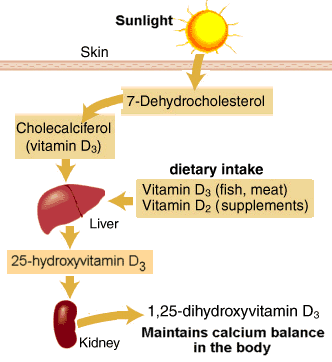
D for diabetes: Study says vitamin D may be needed for diabetics
By Stephen Daniells / December 16, 2008
Over 75 per cent of young type-1 diabetics may require vitamin D supplements, after a US study reported ‘surprisingly’ high levels of insufficiency.
Writing in The Journal of Pediatrics, Boston-based researchers surveyed 128 youths aged between 18 months and 17.5 years with type 1 diabetes. They found that 61 per cent of the youths had insufficient levels of vitamin D, and 15 per cent were clinically deficient.
Insufficient levels of the vitamin may increase the risk of complications later in life, said the researchers, most notably in terms of weakened bone strength, and an increased risk of risk in middle and older age.
“We need to make sure all youths in general are getting enough vitamin D in their diets,” said Britta Svoren, MD, lead author of the study.
“And, we need to pay particular attention to those with diabetes as they appear to be at an even higher risk of vitamin D deficiency. For children who are not drinking sufficient amounts of vitamin D fortified milk, we are encouraging them to take a vitamin D supplement of 400 IU daily,”she added.
Type-1 diabetes occurs when people are not able to produce any insulin after the cells in the pancreas have been damaged, thought to be an autoimmune response. The disease is most common among people of European descent, with around two million Europeans and North Americans affected.
In addition, the incidence of the disease is on the rise at about three per cent per year, according to the authors of a meta-analysis published earlier this year (Archives of Disease in Childhood, doi:10.1136/adc.2007.128579). The number of new cases is estimated to rise 40 per cent between 2000 and 2010.
Study details
Researchers, from the Joslin Diabetes Center in Boston and Harvard Medical School measured levels of serum 25-hydroxyvitamin D (25(OH)D) in the youths. The participants included both those with recent onset of diabetes and those who had long-established diabetes.
Of the 128 youths in the study, only 24 per cent had sufficient levels, and these were mostly the younger participants. Indeed, deficiencies were mostly observed in the older subjects. Furthermore, 85 per cent of the adolescents in the sample demonstrated inadequate vitamin D levels, said the researchers.
In addition to potential skeletal problems later in life as a result of insufficient vitamin D levels, the researchers note that vitamin D deficiency in infants and children is associated with bone deformation, while insufficiency also prevents youths from attaining their optimal bone mass.
“In addition to inadequate levels of vitamin D, adolescent patients with type-1 diabetes potentially possess multiple risk factors for increased skeletal fragility,” wrote the researchers.
Svoren and her co-workers noted that since many of the risk factors for low vitamin D status may not be modifiable, “ensuring vitamin D sufficiency throughout childhood and during the time of maximal bone mineral accrual seems particularly warranted in this population”.
The researchers were interested in looking at vitamin D levels because of the vitamin’s presumed role in immune modulation and because it is thought to possibly play a role in the occurrence of type-1 diabetes.
Indeed, the earlier meta-analysis in the Archives of Disease in Childhood reported a potential protective role from vitamin D on the occurrence of type-1 diabetes.
Shedding light on the sunshine vitamin
Vitamin D refers to two biologically inactive precursors – D3, also known as cholecalciferol, and D2, also known as ergocalciferol. The former, produced in the skin on exposure to UVB radiation (290 to 320 nm), is said to be more bioactive.
Both D3 and D2 precursors are hydroxylated in the liver and kidneys to form 25- hydroxyvitamin D (25(OH)D), the non-active ‘storage’ form, and 1,25-dihydroxyvitamin D (1,25(OH)2D), the biologically active form that is tightly controlled by the body.
Source: The Journal of Pediatrics
January 2009, Volume 154, Issue 1, Pages 132-134
“Significant Vitamin D Deficiency in Youth with Type 1 Diabetes Mellitus”
Authors: B.M. Svoren, L.K. Volkening, J.R. Wood, L.M.B. Laffel
Source / Nutra-Ingredients-USA
Thanks to Janet Gilles / The Rag Blog


















Taking 1000 international units of the vitamin D daily could lower an individual’s cancer risk by 50-per cent, they said. Cardio Cocktail contains 5000 mg of vitamin D3 per ounce.